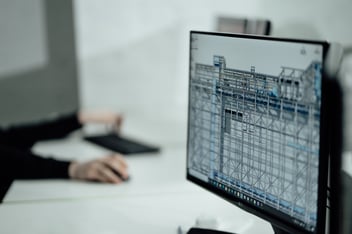2024 - What Can We Expect in the Year Ahead?
Our industry continues to evolve with new developments and initiatives emerging each year. We asked the team for their thoughts on what they think is shaping the industry in 2024 and it probably comes as no surprise that some of the key themes which will run through our industry in the year ahead are digital and sustainability related.
Sustainability and a Digital Revolution - Christine Espinosa-Erlanda, Associate Director
I believe that by the end of 2024, our industry will undergo a shift towards sustainable and technological advancements. One prominent trend is the rise of net-zero and net-positive buildings. These buildings prioritise meeting net-zero or energy standards while also considering factors like low VOC emissions and resilience against climate change. Equally there is a growing emphasis on creating spaces that prioritise the well-being of occupants through design and efficient ventilation systems. Sustainability is deeply ingrained in all our projects serving as a core consideration.
Another noteworthy trend that we anticipate gaining momentum in 2024 is the digital revolution. This transformation involves leveraging intelligence to optimise design processes while Building Information Modeling (BIM) evolves alongside technologies such as 3D printing and augmented reality.
The convergence of these technologies streamlines construction processes, paving the way for a future where environmental consciousness and sustainability seamlessly integrate with cutting-edge technology in architecture and construction practices.
The Integration of BIM in Dubai Municipality - Damir Yanich, BIM Manager
The integration of Building Information Modeling (BIM) into the Building Permitting process by the Dubai Municipality this year has significantly influenced the local BIM industry. Dubai has redefined its approach to urban development and construction projects by embracing BIM practices.
The municipality's adoption of BIM has not only increased the efficiency and precision of project planning and execution but has also set a benchmark for the entire BIM industry in the region. This commitment to BIM principles has improved collaboration among stakeholders, minimised errors, and enhanced overall project outcomes. As a result, there is a growing demand for BIM expertise, creating a vibrant ecosystem of skilled professionals and technology providers.
The impact of BIM within the Dubai Municipality has created opportunities for experienced professionals, opening avenues for new projects, and we eagerly anticipate engaging in these opportunities in the year ahead.
Thoughtful Design - Swati Rokade, Associate
Over the past few years, we have witnessed an increasing awareness of climate change and the critical need to address global warming. People across the world are becoming more environment conscious, and we cannot deny the repercussions that the construction industry has on its environment.
With the recent COP 28 and policy makers highlighting the urgent need for sustainable practices and sustainable design will dictate our design documentation heavily within 2024 and beyond. The use of renewable energy sources, such as solar panels and geothermal systems will be high and net-zero energy buildings will be a key focus for architects.
In interiors as well, sustainable design elements will be at the forefront, from furniture made with recycled materials to energy-efficient lighting solutions. We will see a preference for, and a greater use of, sustainable handmade pieces in rattan, cork, plywood, recycled or upcycled materials.
MEP and Smart Construction - Shivabalan Raveendran, Associate
The year 2024 promises to be a landmark year for MEP. The Internet of Things (IoT) is rapidly transforming buildings into intelligent entities that optimise performance, enhance comfort, and drive sustainability.
By integrating intelligent technologies, MEP systems become more than just functional necessities; they transform into proactive companions that optimise resource consumption, minimise environmental impact, and contribute to a more sustainable future. Schools, hotels, and apartments across the region can leverage this revolution to reduce their energy footprints, foster healthier environments, and operate more efficiently.
The IoT revolution in MEP services is just the beginning. As technology continues to evolve, we can expect even more innovative solutions to emerge. Buildings with human neuro and biometric linked auto control systems, robotic solutions, and advanced management systems for minimal environmental impact are just some of the possibilities.
The future of construction is undoubtedly smart allowing us to create an environment where buildings are not just structures, but dynamic ecosystems that enhance lives and contribute to a more sustainable planet.
.png)













.jpg?width=352&name=verstappen-photography-DuYVeyb2IDE-unsplash%20(1).jpg)
